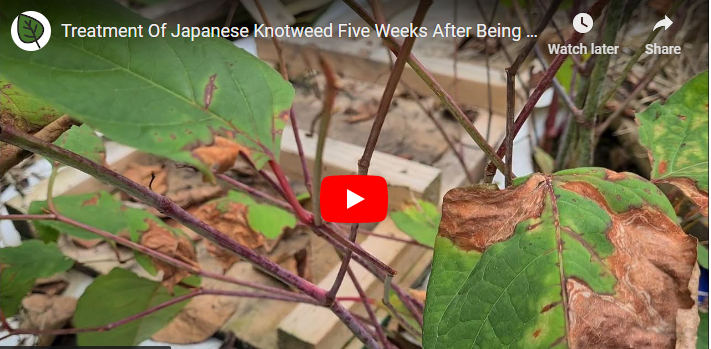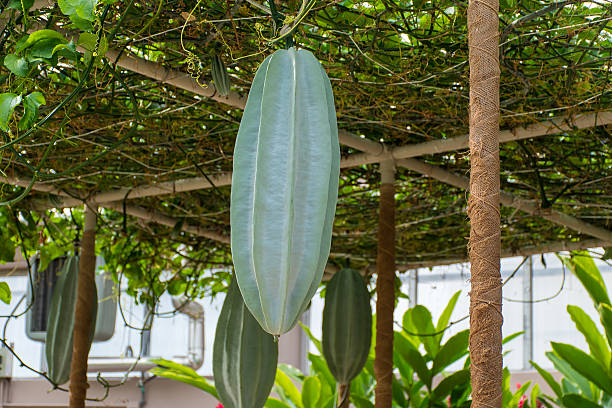Japanese knotweed (Fallopia japonica) is an invasive plant species that can cause significant damage to the environment, infrastructure, and property values. Its aggressive growth and ability to spread rapidly make it a challenging plant to control.
While various methods exist for Japanese knotweed control, the use of herbicides is often the most effective approach. In this article, we will explore the top 10 best herbicides for Japanese knotweed, providing you with valuable insights to combat this invasive species.
Top 10 Best Herbicides for Japanese Knotweed
1. Glyphosate-based Herbicides
Glyphosate-based herbicides, such as Roundup, are widely recognized as effective solutions for controlling Japanese knotweed. Glyphosate works by inhibiting an essential enzyme in the plant, ultimately leading to its death.
These herbicides are systemic, meaning they are absorbed by the plant and transported throughout its tissues. Glyphosate-based herbicides are most effective when applied during the plant’s active growth period.
Read Also: Top 15 Best Herbicides for St Augustine Grass
2. Triclopyr-based Herbicides
Triclopyr-based herbicides, like Garlon, are another popular choice for Japanese knotweed control. Triclopyr is a selective herbicide that specifically targets broadleaf plants, making it an ideal option for targeting Japanese knotweed while minimizing harm to surrounding vegetation. Triclopyr-based herbicides can be applied as foliar sprays or injected directly into the plant’s stems.
3. Imazapyr-based Herbicides
Imazapyr-based herbicides, such as Arsenal, are effective for long-term control of Japanese knotweed. Imazapyr inhibits the production of an enzyme necessary for the plant’s growth, ultimately leading to its demise.
These herbicides are commonly used for both foliar application and soil treatment. Imazapyr-based herbicides provide residual control, preventing the re-establishment of Japanese knotweed for an extended period.
Read Also: Top Best Herbicides For Sugarcane
4. Aminopyralid-based Herbicides
Aminopyralid-based herbicides, like Milestone, are known for their extended residual control of Japanese knotweed. These herbicides are absorbed by the plant and translocated to the growing points, effectively inhibiting the plant’s growth. Aminopyralid-based herbicides are often used in areas where long-term control is desired, such as roadsides and utility corridors.
Read Also: Top 10 Best Herbicides for Clover
5. Clopyralid-based Herbicides
Clopyralid-based herbicides, such as Transline, are effective in selectively controlling Japanese knotweed while minimizing harm to desirable vegetation. Clopyralid disrupts the plant’s hormonal balance, leading to abnormal growth and eventual death. These herbicides are typically applied as foliar sprays, targeting the leaves and stems of the plant.
Read Also: Top 10 Best Herbicides for Creeping Charlie
6. Metsulfuron-methyl-based Herbicides
Metsulfuron-methyl-based herbicides, like Escort, are known for their systemic action against Japanese knotweed. These herbicides are absorbed by the plant and translocated throughout its tissues, inhibiting essential metabolic processes.
Metsulfuron-methyl-based herbicides provide both foliar and soil activity, making them effective for controlling Japanese knotweed at various stages of growth.
Read Also: Top 10 Best Herbicides for Thistles
7. Picloram-based Herbicides
Picloram-based herbicides, such as Tordon, are powerful options for Japanese knotweed control. Picloram disrupts the plant’s growth hormones, leading to abnormal cell division and eventual plant death. These herbicides are typically applied as foliar sprays or injected directly into the plant’s stems.
8. 2,4-D-based Herbicides
2,4-D-based herbicides, such as Weed-B-Gon, are broad-spectrum options that effectively control Japanese knotweed. These herbicides mimic the plant hormone auxin, causing uncontrolled growth and eventual death. 2,4-D-based herbicides can be applied as foliar sprays or used in combination with other herbicides for enhanced control.
Read Also: Top 10 Best Herbicides For Weed Control
9. Dicamba-based Herbicides
Dicamba-based herbicides, like Banvel, provide effective control of Japanese knotweed. Dicamba disrupts the plant’s growth by interfering with its ability to produce essential proteins. These herbicides are typically applied as foliar sprays, targeting the leaves and stems of the plant.
10. Pelargonic Acid-based Herbicides
Pelargonic acid-based herbicides, such as Scythe, offer a non-selective control option for Japanese knotweed. Pelargonic acid rapidly breaks down the plant’s waxy cuticle, leading to desiccation and death. These herbicides are contact-acting and are often used for spot treatments or in combination with other herbicides for comprehensive control.
Read Also: The Top 10 Best Herbicides for Poison Ivy
Application Methods for Herbicides
When applying herbicides for Japanese knotweed control, it is crucial to follow the product label instructions carefully. Some common application methods include foliar sprays, stem injection, and soil treatment. Foliar sprays involve applying the herbicide directly to the leaves and stems of the plant, ensuring proper coverage.
Stem injection involves injecting the herbicide into the plant’s stems, targeting the vascular system. Soil treatment is often used for long-term control, where herbicides are applied to the soil to prevent the re-growth of Japanese knotweed.
Read Also: Top 10 Best Herbicides for Wild Violets
Safety Considerations when Using Herbicides
While herbicides can be effective tools for Japanese knotweed control, it is essential to prioritize safety during their application. Here are some safety considerations:
Wear protective clothing, including gloves, goggles, and appropriate clothing to prevent skin contact.
Choose herbicides labeled for Japanese knotweed control to ensure effectiveness and minimize harm to non-target plants.
Read Also: Top 10 Best Herbicides for Spurge
Apply herbicides when weather conditions are suitable, avoiding windy days to prevent drift.
Keep children and pets away from treated areas until the herbicide has dried or as directed by the product label.
Ensure proper storage and disposal of herbicides, following local regulations and guidelines.
Always read and follow the product label instructions for the specific herbicide being used. The label provides important information on application rates, safety precautions, and any specific requirements for Japanese knotweed control.
Read Also: Top 10 Best Herbicides for Dandelions
It is also worth considering alternative methods of Japanese knotweed control, such as mechanical removal or the use of barriers, in conjunction with herbicide applications. Integrating different approaches can enhance the effectiveness of control and provide long-term management solutions.
Prevention and Long-Term Management of Japanese Knotweed
Prevention is key when it comes to Japanese knotweed management. Taking proactive steps to prevent the establishment and spread of this invasive plant can save time, effort, and resources in the long run. Here are some preventive measures to consider:
Be cautious when purchasing new plants for your garden. Ensure they are not contaminated with Japanese knotweed rhizomes.
Properly dispose of Japanese knotweed plant material to prevent accidental spreading.
Regularly inspect your property for any signs of Japanese knotweed growth and take immediate action if detected.
If Japanese knotweed is present on neighboring properties, establish communication and cooperation to prevent its spread.
Consider professional assistance for effective and comprehensive management, especially for larger infestations.
Long-term management of Japanese knotweed involves ongoing monitoring and control efforts. Regular inspections and early intervention can prevent the plant from establishing dense stands and causing further damage. It is important to develop a management plan that suits your specific situation and consider long-term control methods such as:
Implementing regular herbicide applications in accordance with product labels and local regulations.
Conducting follow-up treatments to target any regrowth or new infestations.
Implementing physical barriers or root barriers to prevent the spread of rhizomes.
Considering biological control options, such as the introduction of specific insects or pathogens that can target Japanese knotweed.
Remember that effective Japanese knotweed management requires patience and persistence. Continuously adapting and implementing control measures will lead to successful long-term management and mitigation of the plant’s impact on the environment and property values.
Can I use herbicides to control Japanese knotweed in my garden?
Yes, herbicides are one of the most effective methods for controlling Japanese knotweed in gardens. However, it is essential to choose the appropriate herbicide and follow the product label instructions carefully to ensure safe and effective control.
Are herbicides safe for the environment?
When used according to the product label instructions, herbicides can be safe and effective for controlling Japanese knotweed. However, it is important to prioritize environmental safety by choosing herbicides labeled for this specific purpose and following proper application techniques.
How often should I apply herbicides to effectively control Japanese knotweed?
The frequency of herbicide applications depends on various factors such as the herbicide used, the size of the infestation, and the growth stage of Japanese knotweed. It is recommended to consult the product label or seek professional advice for specific application guidelines.
Conclusion
Japanese knotweed is a highly invasive plant species that can cause significant damage if left uncontrolled. Choosing the right herbicide for Japanese knotweed control is crucial for successful management.
In this article, we have explored the top 10 best herbicides for Japanese knotweed, highlighting their effectiveness and application methods. Additionally, we have discussed the importance of safety considerations, prevention strategies, and long-term management approaches.
By following proper guidelines and considering preventive measures, you can effectively control Japanese knotweed and minimize its negative impact on your property and surrounding environment.



